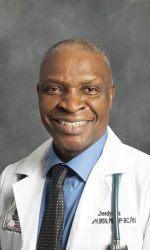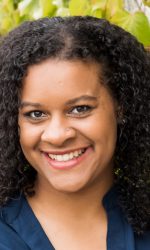Black Husky Nurse alumni
We’re proud to feature our dedicated and outstanding nurse alumni who strive to make a difference in our community.
Jessica Iwuoha, DNP ’20, BSN ’14

Jessica Iwuoha
- Why did you choose nursing?
“I chose nursing because I wanted to have the opportunity to help improve the quality of life for others by working together to maximizing their autonomy and independence. I knew nursing was a broad field that would allow me to give back to my community and help increase access to healthcare for underserved populations.”
- What advice would you give to nursing students?
“I advise nursing students to always keep an open mind. A career in nursing is filled with endless opportunity. Start networking, attend events, meetings and programs that expose you to the field. Explore various healthcare settings. Embrace different cultures to prepare you to provide appropriate care. Most importantly, educate others. Nurses are teachers and advocates.”
- Who in your life has inspired you, especially as it relates to your choosing a nursing career path?
“Watching my mom attend nursing school and make a positive difference in the lives of her patients inspired me to pursue a career in nursing.”
- As a Nurse Camp participant, how did that help shape your experiences at UW and your career in nursing?
“At a young age, nurse camp exposed me to the many possibilities within a nursing career. Being a participant, allowed me to become familiar with the University of Washington School of Nursing (UWSON), the medical center campus and staff and faculty at both facilities. During camp, I was informed of the academic programs at the UWSON, including the Doctor of Nursing Practice (DNP) program. I knew from that experience, in addition to my Bachelors, the DNP was in my trajectory. UW nurse camp provided vision as I went on my educational journey to become a registered nurse and now, a nurse practitioner. I truly feel the reward that comes along with being a part of a patient’s path to wellness, and I thank my experiences at the UW for my accomplishments.”
Cheedy Jaja, MPH ’06 MN ’08

Cheedy Jaja
- Why did you choose nursing?
“I took the scenic route to nursing because I am driven by an insatiable appetite for learning and skill development. Previously, I have worked as an air traffic controller and later as a tenured college professor teaching philosophy and ethics. While both jobs provided unique challenges and satisfaction, I felt compelled to engage in other intellectual and humanitarian pursuits. My wide-ranging educational and world experience signifies the importance I place on knowledge acquisition. However, these pursuits have not been about collecting degrees but represent my vast curiosity about how the world works and how I can be more effective as a scholar and clinician. So, I pursued graduate training in public health genetics at the University of Washington and a postdoctoral fellowship in pharmacogenetics, ethics, and public policy at Indiana University, School of Medicine. These two opportunities provided me with a solid background in genomic and translational sciences. Nursing as a career path became attractive. Nursing provided the arena where I could integrate my multidisciplinary training either as a healthcare team member to provide excellent evidence-based nursing care or pursue research activities that could transform clinical practice. Furthermore, as a graduate trained nurse, I could help educate future nurses and serve local, national, and international communities as a dedicated health care provider.”
- What advice would you give to nursing students?
“Self-care is an essential consideration for nurses. Sometimes we forget that as nurses, we are regular people with responsibilities outside of the hospital, clinical and academic settings. I make this claim against the background of the current Covid-19 pandemic. Currently, we are in the midst of an unprecedented health emergency. Self-care is an important consideration. As nurses, the need to serve our patient communities is self-intuitive. Worldwide, nurses play a significant role in response to disease outbreaks and natural disasters and have done so since the profession’s early origins. Given the current Covid-19 pandemic, there is the social expectation that nurses would undoubtedly respond and deliver appropriate care to affected patients. Nurses invariably assume this responsibility because of a professional “duty to care.” The American Nurses Association (ANA) Code of ethics (second provision) states that nurses’ primary commitment is to the patient. On the same token, concerns about “care for the caregiver” have been expressed in the nursing community with the implication that if we as nurses do not take care of ourselves, how will we be able to care for others? Indeed, the fifth provision in the ANA Code for Ethics also states that the nurse owes the same duty to self as to others. So, nurses have an ethical obligation to care for others and care for themselves.
- Who in your life has inspired you, especially as it relates to your choosing a nursing career path?
During my academic training at UW, I was inspired, trained, and mentored by several eminent clinicians and professors. And I am very grateful for the experiences, interactions, and support I had received and continue to receive over the years. However, regarding choosing nursing as a career path, the motivation stemmed mostly from my interest in social justice, health disparities, and improving health outcomes in historically marginalized and vulnerable populations. I work primarily with sickle cell disease (SCD) patients, both nationally and internationally, in my clinical practice and research activities.
Pain is the main symptom of sickle cell disease. In many large medical centers in the USA, some SCD patients whose pain experience warrant frequent ED visits and hospital admissions are readily labeled as “drug seekers” or “addicts” which often leads to withholding adequate pain therapy with opioids. Within the backdrop of well-known, documented disparities in pain management in general, SCD patients represent an even more vulnerable and underserved segment of the minority population suffering from additional disparities and discrimination. The socio-economic status of patients with SCD and the nature of the disease makes them subjects of further healthcare disparity. My current pharmacogenetics research program aims to design genomic decision tools for identifying patients whose pain experience warrants patient-specific treatment plans using genomic adjusted dosing prescribing strategy.
For sickle cell disease patients in Africa, the situation is even dire. An unsettlingly high under-five mortality rate is associated with SCD in many African countries even though standard public-health care packages are available and used in middle-and high-income countries over the past 30 years. My recent professional partnerships and research initiatives in the West African nation of Sierra Leone are efforts to reduce this global health disparity gap. Specifically, my global health outreach initiatives promote diagnosis of SCD in infancy, care coordination, and early evidence-based interventions for affected Sierra Leone children and their families. The impact of my pharmacogenomics research, health systems strengthening, and capacity building program have been disseminated as peer-reviewed publications and from the podium at home and abroad.
L’Oreal Kennedy, BA ’09 DNP ’16

L’Oreal Kennedy
- Why did you choose nursing?
“I chose nursing because I wanted to purse nurse-midwifery and care for people who have a uterus/vagina/ovaries across the life span using the nursing model where a person in their environment is more of the focus, rather than pathologizing natural states of being, such as pregnancy.”
- What advice would you give to nursing students?
“It is important to center equity in everything you do and not leave this to the most marginalized folks in our profession. As students, get involved and leverage your privileges to dismantle systems of oppression – the lives of your patients depend on it.”
- Who in your life has inspired you, especially as it relates to your choosing a nursing career path?
“My inspiration continues to be the Black community. I originally chose nursing, particularly midwifery, after serving young Black mothers who were pregnant or parenting their first child while experiencing houselessness and ongoing systemic racism. They were my why and their influence lives on in my work today.”